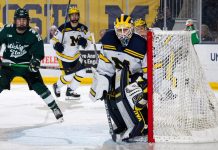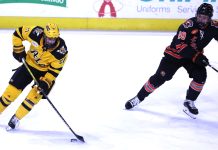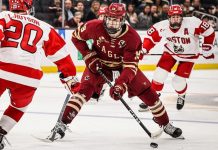Let The Games Begin
Although only Northeastern had a game that actually counted last weekend, the chance to take the ice for even a meaningless exhibition contest was more than welcome for athletes who’d had a steady diet of captain’s practices, conditioning workouts, pickup games, official practices and intrasquad scrimmages. Finally, here was hockey with some meat on its bones.
A case in point was Massachusetts-Lowell star Ed McGrane, who a week ago looked forward to the River Hawks tilt against Concordia.
“Geez, this exhibition game is like playing at the FleetCenter right now,” he said. “You’ve been waiting all summer and been thinking about hockey all summer and doing dryland training and then practices. Now it’s just like we want to get on the ice and wear our jerseys again. We want to play some hockey again. It’ll be a big thrill.”
Many stircrazy fans feel just the same way.
The Early Leaders
The Northeastern Huskies currently lead Hockey East in all statistical categories. Three goals per game, tops in offense. Three goals against per game, tops in defense. The list continues: 37 shots per game, 36 saves per game, one shorthanded goal per game and a penalty-killing percentage of 75. The Huskies similarly dominate all the top individual stats.
Of course, it helps to have played the only official game to date.
I Don’t Get It
This will no doubt unleash torrents of nasty emails from Commonwealth Avenue, but I just don’t get it.
Certainly any of the four perennial powerhouses rank as reasonable choices to win the Hockey East title this year. But Boston University’s clear-cut selection as the top pick in the coaches’ preseason poll — most notably at the expense of New Hampshire — surprises me. Since no coach could vote for his own team, there were eight first-place votes available to the Terriers and they garnered all but two of them.
A more or less even distribution of votes among four co-favorites would not have surprised me. New Hampshire as a clear-cut favorite would not have surprised me. BU as a clear-cut favorite, however, does surprise me.
Obviously, the Hockey East coaches aren’t collectively out there losing sleep over the fact that yours truly disagrees with them. Hey, they’re the experts and, as my readers like to point out so fondly and so frequently, I are a moron.
But let’s look at this.
Last year, UNH finished first in the league during the regular season, won the Hockey East tournament and advanced to the Frozen Four. BU could claim none of those highlights. The Wildcats finished the season ranked first in the league in all four major categories: team offense, team defense, power-play percentage and penalty-kill percentage. The Terriers, by comparison, finished third, third, fifth and second, respectively, in those same categories.
UNH then lost Darren Haydar, David Busch, Ed Caron and Matt Carney. While the Terriers graduated no one of the stature of Haydar, they still lost Mike Pandolfo, Jack Baker, Chris Dyment, Pat Aufiero and Jason Tapp.
Looking at the offense, UNH must replace 49 goals scored to 46 for BU, a negligible difference. The gap is wider in assists, but the Wildcats have five players (Colin Hemingway, Sean Collins, Lanny Gare, Josh Prudden and Jim Abbott) returning with more points last year than their top counterparts on Babcock Street.
Defensively, New Hampshire did lose half of its 1A-1B goaltending tandem when Carney graduated, but Michael Ayers arguably outperformed him and could easily, one would think, shoulder as much of the load as BU’s Sean Fields if freshman Jeff Pietrasiak isn’t as good as advertised. And on the blue line, the Wildcats return everyone except for Garrett Stafford, who’ll miss the first semester due to academic ineligibility. By contrast, the Terriers must replace both Chris Dyment and Pat Aufiero.
Yes, BU’s recruiting class is a very impressive one, but UNH’s is hardly chopped liver. And, of course, BU coach Jack Parker can be a magician when it comes to getting the most out of his players. But UNH coach Dick Umile is also the reigning Hockey East Coach of the Year for a reason.
I just don’t see BU garnering all but two of the first-place votes.
I won’t be a surprise if the Terriers finish on top, but my money is on UNH.
If I’m right, I’m sure my email box will be almost empty. If I’m wrong, though, I fully expect that it will be overflowing with messages from Commonwealth Avenue reminding me of one of life’s few unshakable truths.
I are a moron.
Sadness At UMass
Condolences go out to Massachusetts freshman Matt Fetzer, whose 48-year-old mother died suddenly of an embolism.
“[The team] was all there when Mattie got the word,” says UMass coach Don Cahoon. “It was very traumatic. It had an unbelievable affect on everybody. There’s still a dark cloud hanging over everybody.
“It’s a terrific family. … It leaves a huge void.”
Debbie Fetzer leaves her husband, Brian Fetzer, and five children ranging in age from 21 to nine. She had planned to make the trip from Chicago to see her son play in Sunday’s home opener. A kid’s first college hockey game is supposed to be a moment of great pride for him and his family. Instead, the Fetzers have found out that sometimes life is just not fair. Our thoughts are with them.
The Fish Changes Hands
Perhaps Hockey East’s most colorful tradition is the throwing of a fish onto the ice at UNH home games after the first Wildcat goal is scored. The fish underlines the opposing goaltender’s need to “fish” the puck out of the net.
There are many great fish stories. Such as the time one mysteriously found its way from the ice to the cargo hold of an opposing team’s bus. Or the evening when a Division III opponent deemed less than worthy was greeted by a mere sardine.
The latest twist in the fish saga is that the Zeta Chi fraternity, which has long been responsible for the fish, is being relieved of that honor by the UNH athletic department.
“The athletic department is not taking away the tradition of the fish,” says Umile. “That goes back a long way and the fraternity that has been involved has been supportive. But I think at this point the athletic department’s thought was to give other organizations, other fraternities, and other people in the community involved because it is such a great tradition.”
Verbal Agreements in General and Brian Pouliot in Particular
Although it’s been quite a few years since I’ve seen him play, I’ve known Brian Pouliot for a very long time. He and my son skated in camps together and the two played on several teams that I helped coach. Exhibit A would be the 1994 tryout application I recently dug out of a file folder which listed him at 4 feet, 6 inches and 70 pounds. I guess you could say that he’s filled out a bit since then.
Brian, a really nice kid, had great hands and a scoring touch even back then and this year he stands a good chance of leading the EJHL in scoring. An attractive recruit, he verbally committed to UMass-Lowell in the summer as he looked ahead to his final year of juniors. Recently, however, he backed out of that agreement and switched to New Hampshire.
UNH would be a logical destination for any top-notch kid from the Granite State like Brian, but the reversal of intentions has prompted some controversy
“I committed to UMass-Lowell fairly early,” says Pouliot. “When I committed, I had taken unofficial [visits] to BC, Providence and Lowell. On unofficials, it’s gives you a real strong visual of the school and the facilities, but school was out — it was in summer session — so you didn’t really get a good feel for the students and that aspect of the school.
“It all came at me at once and I may have jumped the gun. I decided to take my real official visit at UMass-Lowell a month ago to see the student body. After taking that, I started having some second thoughts on whether I was going to fit in, not as an athlete but as a student. 75 percent of the time I’ll be with the team, but I want to make sure that I’m happy that other 25 percent of the time. It’s the next four years of my life and I don’t want to look back and have any regrets.
“That’s when I decided to call Lowell and let them know that I wanted to take a step back and reenter the whole process of visiting a few more schools that I didn’t get a chance to visit [before] and basically make sure that wherever I decided to go I wouldn’t have any regrets.
“That’s when I decided to call UNH. I hadn’t really thought about them earlier in the process because when I was talking to BC, Providence and Lowell, I got caught up in those three schools and jumped the gun and committed to Lowell without stepping back and asking myself, ‘What if I wait? I might have some other schools [pursuing me].’
“When you look at UMass-Lowell and UNH, one is a city school and one is kind of a countryside school. Two different types of schools. I loved the team at UMass-Lowell, but I’m not sure that the city environment is what I was looking for. I know I’m going to be much happier at UNH.”
Obviously, Umile is thrilled with the outcome.
“He’s a kid from New Hampshire and Lowell had done a very good job in the recruiting of him,” says Umile. “But after making the verbal commitment, for whatever the reasons, he wasn’t quite sure [of his decision]. He wanted to visit some other schools and he visited us. He went through [UML coach] Blaise [MacDonald] and his staff and ultimately made the decision to change his mind.”
Of course, MacDonald is less than pleased.
“I thought [assistant coach] Kenny Rausch and our staff did a good job of identifying Brian early and recruiting him,” says MacDonald. “Brian made a decision based on Providence, Boston College and us and chose Lowell so we were pretty pleased with that.
“Then what happened is that he got the sense that maybe if he had waited longer, UNH might be an option. Whereas UNH really hadn’t been recruiting him early on, perhaps there was the sense that maybe UNH is an option. Being a New Hampshire kid and a good player, there’s no question in my mind that it’s logical for him to want to look at that. I think that’s pretty much what transpired through a series of events.
“I’m very disappointed to lose Brian because I thought we had done a good job recruiting him. He had verbally committed and it was known to everybody that he was coming to Lowell. Then some things changed and opened up his mind perhaps that there may be some other options.”
All of which leads MacDonald to wonder if some teeth need to be added to the informal agreement among league coaches to step back from recruits who have verbally committed to other league teams.
“[It] needs to be looked at and perhaps be better defined,” he says. “There is no policy. That’s the problem. There’s nothing that’s enforceable. There’s no due process. Maybe we need to look into a policy, just for our league not for the NCAA.”
Hockey East Commissioner Joe Bertagna says with a perhaps rueful laugh, “I don’t know the particulars of this case and I’m happy not to.
“[In general, though], there are these informal agreements — informal because they’re sometimes not [even] put down in writing — and maybe more to the point, they’re not enforceable because they’re not backed by a structure like a conference that has procedures to back up rules and punishments if the rules are broken.”
While Hockey East could certainly formalize such an agreement, it’s not likely to come anytime soon.
“I think you have to also understand that in the end a family is always free to do whatever they want to do,” says Bertagna. “What also makes these things difficult is whether there’s clarity that somebody actually violated the spirit of whatever agreements are in place. I’ve never been a recruiter, but sometimes a very innocent remark can be construed by a family as something else and maybe it goes to how deep a commitment somebody has made if they can change their mind.”


